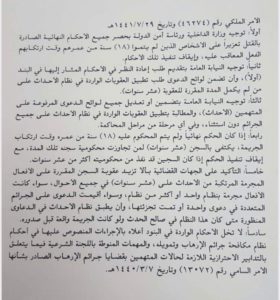
On 24 March 2020, the Government of Saudi Arabia issued a royal decree to suspend all death sentences in the form of taazir against persons who had not attained 18 years of age at the time of the commission of their alleged offence, and to amend all provisions in accordance with the juvenile system to provide fora maximum penalty of imprisonment for a period not exceeding 10 years. The European Saudi Organization for Human Rights has noted that the decision contains serious gaps, as its sixth article excludes children who face the risk of execution according to the Anti-Terrorist Crime Law and it’s financing, or who do not fall under thetaazirof punitive provisions.
The sixth clause of the royal decree is extremely problematic, providing a loophole through which prosecutors may continue to seek the death penalty against children, as it allows for the death penalty to be applied to anyone tried underthe government’s anti-terrorism regime.This is a system that is widely used to oppress human rights defenders, opponents, demonstrators and journalists. The clause states that “the provisions mentioned in the above clauses do not prejudice the procedures stipulated in the Anti-Terrorist Crime Law and its financing,” which means that the Saudi government may continue to carry out the death penalty in order to subjugate those who have been tried in accordance with the terrorism law.
The first clause is also problematic, providing that the death sentence can still be proscribed against persons found guilty of hudud or qisas offences, categories of crime for which punishments are already determined in the Sharia.
All told, between the anti-terrorism loophole and the provisions regarding hudud and qisas, none of the 13 persons found guilty of offences they allegedly committed as minors will be touched by this law.
The fact that Saudi Arabia uses anti-terrorism laws against human rights defenders, activists, and demonstrators was confirmed by international law expert Michael Newton in his analysis on ther legality, while the Special Rapporteur on the promotion and protection of human rights in the context of counter-terrorism at the United Nations Ben Emerson demanded that the government review all decisions issued under this system.
The issuance of royal orders and laws in Saudi Arabia does not necessarily mean that they will actually be applied, as loopholes abound in the Saudi system. In August 2018, for example, the government issued the “Juveniles Law” that related to penalties for anyone under the age of 18. Ostensibly, that law, too, banned the State from executed minors. That juvenile law, however, also excluded “provisions prescribed by law with regard to hudud and qisasa.” Since the issuance of the system, Saudi Arabia has executed 7 children distributed between the provisions of tazir and qisas.
ESOHR believes that this royal order is part of an attempt to mislead international public opinion while still allowing the state to execute children. The President of the Human Rights Commission Awad Al-Awad said, “The royal order means that any person who has been sentenced to death for crimes committed while a minor is no longer facing execution.” The Saudi government confuses international media by using multiple legal vocabularies, such as qisas,tazir, and hudud, and leads them to believe that the death penalty for minors is still permanently illegal. According to ESOHR’s multitude of sources, this is just not true.
In all cases, ESOHR believes that merely issuing a law or royal order does not mean that that law will be implemented, as the Saudi judiciary does not enjoy independence from the government.All judicial decisions are subject to the authority of the king.
his behaviour has been repeated over and over again, and can be observed in how the government fails to implement internationals Conventions to which it has acceeded, including the Convention on the Rights of the Child and the Convention against Torture.

